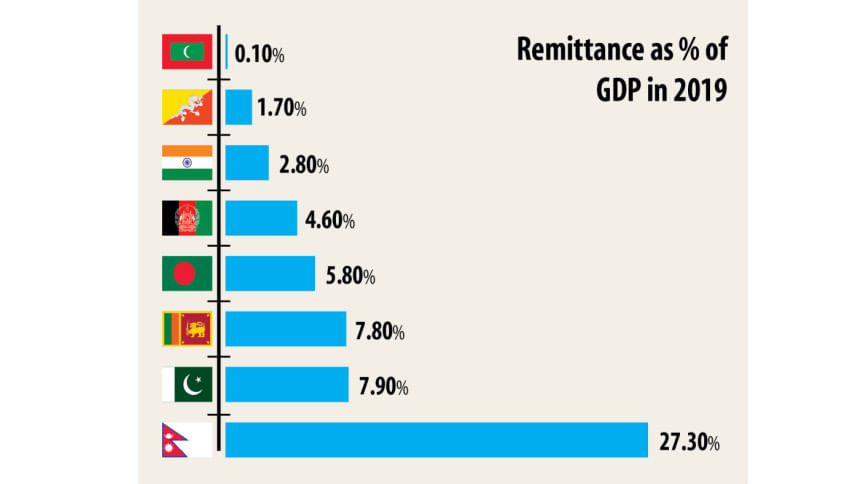Remittance to nosedive 22pc in 2020: WB

Remittance flow to Bangladesh may plunge by as much as 22 per cent in 2020 because of the fallout of the global coronavirus pandemic, in a major blow to the economy, said the World Bank yesterday.
Money sent by the migrant workers is projected to fall to $14 billion this year, said the multilateral lender in its Migration and Development Brief.
Remittance is Bangladesh's second-largest source of foreign earnings after the garment industry.
The inflows from the migrant workers, which rose 21.49 per cent to $11.05 billion in the first seven months of the fiscal year on the back of the 2 per cent cash incentive, had kept the growth momentum until January this year.
But the momentum came crashing in the following months as the impact of the deadly bug started to become evident. In March, remittance fell 12 per cent year-on-year to $1.28 billion, the lowest in 15 months.
Coronavirus, which originated in China in December last year, has affected both international and internal migration in South Asia.
As the early phases of the crisis unfolded, many international migrants, especially from the Gulf countries, returned to countries such as India, Pakistan and Bangladesh, the WB said.
Gulf countries, which include Saudi Arabia, the UAE and Kuwait, are home to 75 per cent of about 1 crore Bangladeshis living abroad.
Since the middle of February, about 2 lakh migrant workers returned home, with most arriving from Saudi Arabia, the UAE and Malaysia, according to Shariful Islam Hasan, head of BRAC's migration programme.
Remittances to South Asia are projected to decline 22 per cent to $109 billion in 2020, following the growth of 6.1 per cent in 2019.
Falling oil prices will affect remittance outflows from the GCC countries and Malaysia and the coronavirus-induced economic slowdown from the US, the UK and the EU to South Asia.
Apart from the GCC countries, a major chunk of Bangladesh's migrant workers lives and work in Malaysia and Singapore, while the US and the UK are respectively home to 5 lakh and 10 lakh expatriate professionals.
"The ongoing economic recession caused by COVID-19 is taking a severe toll on the ability to send money home and makes it all the more vital that we shorten the time to recovery for advanced economies," said World Bank Group President David Malpass in a press release.
The coronavirus-related global slowdown and travel restrictions will also affect migratory movements, and this is likely to keep remittances subdued even in 2021, the brief said.
In the past, remittances have been counter-cyclical, where workers send more money home in times of crisis and hardship back home. This time, however, the pandemic has affected all countries, creating additional uncertainties.
"Effective social protection systems are crucial to safeguarding the poor and vulnerable during this crisis in both developing countries as well as advanced countries. In host countries, social protection interventions should also support migrant populations," said Michal Rutkowski, global director of the social protection and jobs global practice at the WB.
So far, the WB said, government policy responses to the coronavirus crisis have largely excluded migrants and their families back home.
But there is a strong case for including migrants in the near-term health strategies of all countries, given the externalities associated with the health status of an entire population in the face of a highly contagious pandemic.
"Quick actions that make it easier to send and receive remittances can provide much-needed support to the lives of migrants and their families," said Dilip Ratha, lead author of the Brief.
Finance Minister AHM Mustafa Kamal has urged the Asian Development Bank to provide another $150 million, which would be used to create jobs for the local Bangladeshis and migrant workers who have lost jobs as well as rehabilitate the micro, cottage, small and medium entrepreneurs.


 For all latest news, follow The Daily Star's Google News channel.
For all latest news, follow The Daily Star's Google News channel. 



Comments